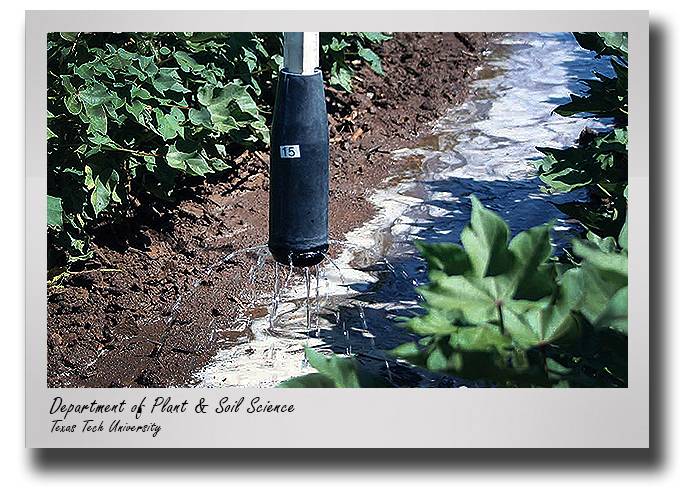Davis College researchers look for sustainable solutions to water shortages
By: Allen Ramsey
 Texas Tech researchers are working to help farmers in semi-arid regions deal with
a dwindling water supply. Three professors in the Davis College of Agricultural Sciences
& Natural Resources recently received a $294,000 grant from the USDA’s National Institute
of Food & Agriculture to study the integration a resilient cropping system and precision
conservation for sustainable agriculture in a semi-arid region.
Texas Tech researchers are working to help farmers in semi-arid regions deal with
a dwindling water supply. Three professors in the Davis College of Agricultural Sciences
& Natural Resources recently received a $294,000 grant from the USDA’s National Institute
of Food & Agriculture to study the integration a resilient cropping system and precision
conservation for sustainable agriculture in a semi-arid region.
 “The overall challenge in this region is the lack of water, and now the water from
the Ogallala Aquifer is actually running out,” said principal investigator Wenxuan Guo, an assistant professor of crop ecophysiology and precision agriculture in the Department
of Plant and Soil Science. Guo also holds a joint appointment Texas AgriLife Research.
“The overall challenge in this region is the lack of water, and now the water from
the Ogallala Aquifer is actually running out,” said principal investigator Wenxuan Guo, an assistant professor of crop ecophysiology and precision agriculture in the Department
of Plant and Soil Science. Guo also holds a joint appointment Texas AgriLife Research.
Guo and his team will use predictive modeling techniques to gain a better understanding of which crops will work best in rotation depending on the amount of water available in the future.
“We want to know, with limited rainfall, if the agricultural production in this region is resilient or not,” Guo said. “We'll look at different climate change scenarios – a modest one, an extreme one and something in between – and we'll use this model to predict what we need to do to adapt to that new environment.”
 Guo's focus is on producing models for sustainable cropping systems, but he is joined
on the project by Chenggang Wang, an associate professor in the Department of Agricultural & Applied Economics who
will help determine which of the cropping systems show the most promise economically.
Guo's focus is on producing models for sustainable cropping systems, but he is joined
on the project by Chenggang Wang, an associate professor in the Department of Agricultural & Applied Economics who
will help determine which of the cropping systems show the most promise economically.
“The economic analysis in this project will be focused on evaluating the economic performance of alternative cropping systems selected by scientists on our team,” Wang said. “This involves not only measuring profitability but also quantifying risk.
“Farming communities in the Southern High Plains of Texas are dealing primarily with two types of risk: the weather risk and the risk of dwindling water supply. A cropping system may be best suited for the soil condition in a region, but it has to be able to generate stable income for farmers in order to be valuable.”
The project also is joined by Department of Plant & Soil Science Chair Glenn Ritchie, who focuses his research on economical water management. “Maximizing the value of our limited water resources is critical to successful agriculture in the Southern High Plains,” Ritchie said. “This research is timely and important to the continued success of agriculture in semi-arid regions around the world.”
CONTACT: Glen Ritchie, Department Chair, Department of Plant & Soil Science, Texas Tech University at (806) 834-4325 or glen.ritchie@ttu.edu
0517NM22
Davis College NewsCenter
-
Address
P.O. Box 42123, Lubbock, Texas 79409-2123, Dean's Office Location:Goddard Building, Room 108 -
Phone
(806)742-2808 -
Email
kris.allen@ttu.edu
